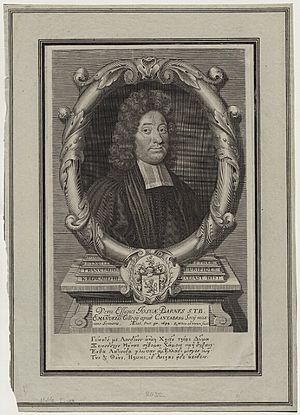Joshua Barnes facts for kids
Quick facts for kids
Joshua Barnes
|
|
|---|---|
 |
|
| Born | 10 January 1654 |
| Died | 3 August 1712 |
| Occupation | Classical scholar, antiquarian |
| Position held | Regius Professor of Greek (1675–1712) |
Joshua Barnes (born 10 January 1654, died 3 August 1712) was an English scholar. He was very good at studying ancient languages and history. One of his interesting books was Gerania (1675). This story was about discovering a small group of people called Pygmies. It is considered a type of Utopian romance.
About Joshua Barnes
Joshua Barnes was born in London. His father, Edward Barnes, was a merchant taylor. Joshua went to school at Christ's Hospital and later studied at Emmanuel College, Cambridge.
In 1695, he became the Regius Professor of Greek at Cambridge University. This meant he was a top expert in the Greek language. He could write and speak Greek very well. In 1710, he became a Fellow of the Royal Society. This is a group of important scientists and scholars.
His Books and Writings
Barnes wrote many different kinds of books. One of his first was Gerania (1675). This was a fun and imaginative story. Some people think it might have inspired parts of Jonathan Swift's famous book, Gulliver's Travels, especially the part about Lilliput.
He also wrote a long history book called History of that Most Victorious Monarch Edward III (1688). This book was over 900 pages long! It included many detailed speeches within the story.
Joshua Barnes also worked on new versions of old Greek writings. He edited works by famous ancient writers like Euripides (1694), Homer (1711), and Anacreon (1705). He even wrote some of his own Greek poems, which he hoped to publish.
Later Life
In 1700, Barnes married a woman named Mrs. Mafon. He passed away on 3 August 1712, when he was 58 years old. He died in a place called Hemingford Grey, near St Ives, Huntingdonshire. His wife built a monument there to remember him.
Barnes as a Fiction Writer
Today, experts like Robert Ignatius Letellier see Gerania as an early example of adventure novels. These stories often involved imaginary journeys to strange or made-up places. They combined exciting adventures with ideas about how people should live.
This type of story followed a tradition started by Thomas More's book Utopia (1516). Other famous examples include The Blazing World (1666) by Margaret Cavendish, Duchess of Newcastle-upon-Tyne and The Isle of Pines by Henry Neville. These kinds of stories later led to well-known books like Robinson Crusoe (1719) by Daniel Defoe.
 | Delilah Pierce |
 | Gordon Parks |
 | Augusta Savage |
 | Charles Ethan Porter |

